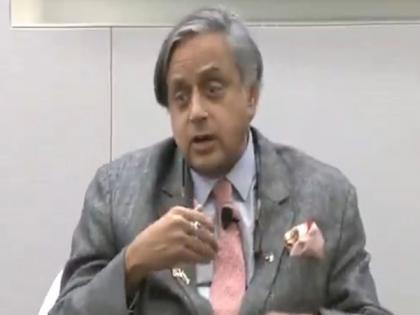"We were recalibrating our strategies": Shashi Tharoor on India adapting to China's technology during Op Sindoor
By ANI | Updated: June 5, 2025 22:58 IST2025-06-05T22:52:41+5:302025-06-05T22:58:19+5:30
Washington DC [US], June 5 : Congress MP Shashi Tharoor, leading an all-party delegation to the United States on ...

"We were recalibrating our strategies": Shashi Tharoor on India adapting to China's technology during Op Sindoor
Washington DC [US], June 5 : Congress MP Shashi Tharoor, leading an all-party delegation to the United States on Thursday, discussed India's military strategies against China's technology, particularly during Operation Sindoor.
He highlighted India's ability to adapt and respond effectively to China's advanced systems. Tharoor mentioned China's "kill chain" technology, integrating radar, GPS, planes, and missiles for instant reactions.
"The reassessment took place while the fighting was going on. When we saw what the Pakistanis were tempted to do using, as you say, Chinese technology, there's supposed to be something called a kill chain that the Chinese specialise in, wherein the radar, GPS, planes and missiles are all linked together, and they react instantly... We simply did things differently; otherwise, we wouldn't have been able to hit 11 airfields, and we wouldn't have been able to breach the Chinese supply to their defences. So it's clear that assessments were taking place while the fighting was happening and we were recalibrating our strategies to end as effectively as we were able to end...," Tharoor emphasised that India assessed and recalibrated its strategies during the conflict to counter Chinese defences effectively and hit key targets.
Notably, during Operation Sindoor, India, in addition to eliminating over 100 terrorists, destroyed 11 air bases inside Pakistan and inflicted significant damage on their military capabilities. The air, land and sea operations were carried out with calibrated restraint, emphasising minimising civilian casualties.
Tharoor noted China's significant stakes in Pakistan, particularly through the Belt and Road Initiative's China-Pakistan Economic Corridor, highlighting the complexity of the region's geopolitics.
"The fact is, China has immense stakes in Pakistan. The largest single project the Belt and Road Initiative is in Pakistan, the China-Pakistan Economic Corridor. So we have no illusions about the degree of commitment that China may feel towards Pakistan," added the Congress leader.
Tharoor also acknowledged China's influence in the region, noting its role as a significant supplier of funds, often through loans that can lead to unsustainable debt obligations for recipient countries.
"China does come in and play a role. I mean, there's no doubt about that. China can be a fairly munificent supplier of funds. They are often loans and not grants, and some involve unsustainable debt obligations on the part of the recipients. Um, and so yes, you've implied there are specific issues we need to address," said Tharoor.
He emphasised the importance of the neighbourhood to India, highlighting its responsibility to care for the well-being of its neighbours. "We as a country have always appreciated that when we sit around the table with our neighbours, we account for 70% of the land mass and 80% of the GDP. I mean we have a responsibility to care for the well-being of our neighbours, and we are conscious of that," he added.
Tharoor highlighted that Pakistan's obstructionism hindered regional cooperation efforts, particularly within the South Asian Association for Regional Cooperation (SAARC).
"We were trying to make a goal of the South Asian Association for Regional Cooperation, but Pakistan obstructed that because they could not have these relationships blossoming as long as they had a grudge with India. And unfortunately, the South Asian Association worked on consensus so that nothing could get done," said Tharoor.
He said India revived the Bay of Bengal Initiative for Multi-Sectoral Technical and Economic Cooperation (BIMSTEC), a sub-regional organisation that excludes Pakistan and focuses on cooperation with countries to the east.
"India has now revived another sub-regional organisation called BIMSTEC, which does not include Pakistan, and sadly, it doesn't include the Maldives either, because they're to the west of the Bay of Bengal, but all the countries to the east, including Thailand and Myanmar, are part of this initiative, so it's not that we are in any way backing off from regional cooperation. We want it, but there are specific challenges. However, we can go country by country at some point. I'm sure my colleagues in the Indian Embassy will happily help the US State Department on that."
Disclaimer: This post has been auto-published from an agency feed without any modifications to the text and has not been reviewed by an editor
Open in app